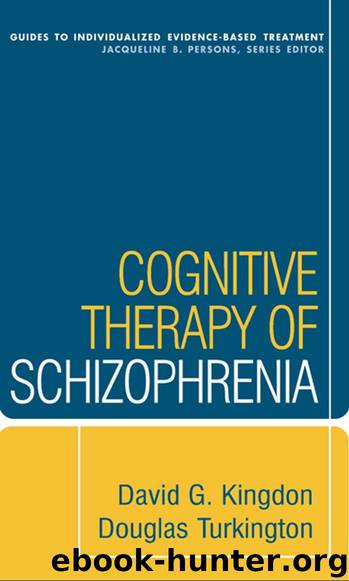Cognitive Therapy of Schizophrenia by David G. Kingdon & Douglas Turkington

Author:David G. Kingdon & Douglas Turkington
Language: eng
Format: mobi
Tags: Psychopathology, Nursing, Medical, Psychiatric, General, Cognitive Psychology & Cognition, Schizophrenia, Psychiatry, Psychology
ISBN: 9781593851040
Publisher: Guilford Press
Published: 1993-12-09T22:00:00+00:00
102
COGNITIVE THERAPY OF SCHIZOPHRENIA
If in doubt, however, it’s perfectly acceptable to leave the statement as it stands at this point in proceedings. As the key beliefs emerge, so they can be explored individually to understand how they developed.
The ABC framework used in other areas of cognitive therapy may be helpful in
clarifying the relationship between events and beliefs (see Figure 9.1). It can be used to distinguish between activating events, beliefs, and consequences, as these frequently
become confused, with people jumping from A‘s to C‘s without considering the intermediary belief. Examining each part of the sequence can clarify it and allow the person to begin to question assumptions (Chadwick et al., 1996).
At this stage, other negative thoughts may be emerging, and these affect the indi-
vidual similarly to other conditions (such as depression), among which are:
• Personalization (“taking things personally”)
• Selective abstraction (“getting things out of context”)
• Arbitrary inference (“jumping to conclusions”)
• Minimizing
• Maximizing (“making mountains out of molehills”)
• Overgeneralization
• Dichotomous reasoning (“all-or-nothing thinking”)
Such cognitive errors are central to understanding delusional beliefs. While it is per-
fectly normal to center one’s attention on oneself, it can be easy to take things too personally, especially when there is no external feedback (e.g., from friends or family, who are available or with whom there is a trusting relationship). This can also occur when
the person suffers from sensory impairment (e.g., deafness or blindness) that need not
be complete but that interferes with functioning sufficiently to affect clarity of communication and confidence.
Such impairments can mean that events that are inconsequential are made to seem
consequential. Someone in the street is heard to say “That’s a rip-off” and the person
mistakenly thinks it refers to him- or herself—“That means I’m a rip-off” (in other
words, useless). The context may quickly be forgotten. For example, a procession of
large black cars coming slowly down the road may be taken to mean that “It is the Ma-
fia being sent to get me” when in reality it is a funeral procession. A bus doesn’t come—
“That means that the police have intercepted it because they saw I was waiting for it, so FIGURE 9.1. ABC model.
Case Formulation and Intervening with Delusions
103
TABLE 9.2. Understanding Experiences
• Let the person lead.
• Explore the person’s models of his or her mental health problems first.
• Normalize but don’t minimize.
• Use the vulnerability–stress model to explain illness.
—Identify vulnerabilities: family history, birth difficulties, “sensitive
personality,”, brain injury.
—Identify stressors (possibly describe evidence): work, school, college,
sexual relationships, and in drug or alcohol abuse.
that I will not go and expose them.” Voices say “You are hopeless”—“and the fact that I forgot to get cereal for my son for breakfast tomorrow confirms that,” whereas the person actually looks after his or her home and son very well (this being a case of minimizing the good and maximizing the bad, or rather a minor mistake). “Everybody on TV is
talking about me” is an overgeneralization that lends itself to investigation and debate.
Dichotomous reasoning (“all-or-nothing” thinking) may reinforce delusional convic-
tion in certain circumstances through such beliefs as “all people with large noses, such as me, are ugly and will be shunned by other people.
Download
This site does not store any files on its server. We only index and link to content provided by other sites. Please contact the content providers to delete copyright contents if any and email us, we'll remove relevant links or contents immediately.
| Administration & Medicine Economics | Allied Health Professions |
| Basic Sciences | Dentistry |
| History | Medical Informatics |
| Medicine | Nursing |
| Pharmacology | Psychology |
| Research | Veterinary Medicine |
The Art of Thinking Clearly by Rolf Dobelli(10451)
The 5 Love Languages: The Secret to Love That Lasts by Gary Chapman(9784)
Mindhunter: Inside the FBI's Elite Serial Crime Unit by John E. Douglas & Mark Olshaker(9318)
Becoming Supernatural by Dr. Joe Dispenza(8200)
Nudge - Improving Decisions about Health, Wealth, and Happiness by Thaler Sunstein(7690)
The Road Less Traveled by M. Scott Peck(7594)
Mastermind: How to Think Like Sherlock Holmes by Maria Konnikova(7321)
Enlightenment Now: The Case for Reason, Science, Humanism, and Progress by Steven Pinker(7306)
Win Bigly by Scott Adams(7183)
The Way of Zen by Alan W. Watts(6600)
Factfulness: Ten Reasons We're Wrong About the World – and Why Things Are Better Than You Think by Hans Rosling(4731)
The State of Affairs by Esther Perel(4711)
Gerald's Game by Stephen King(4641)
Man's Search for Meaning by Viktor Frankl(4580)
The Confidence Code by Katty Kay(4251)
Thinking in Bets by Annie Duke(4218)
The Healing Self by Deepak Chopra(3568)
Hidden Persuasion: 33 psychological influence techniques in advertising by Marc Andrews & Matthijs van Leeuwen & Rick van Baaren(3552)
The Worm at the Core by Sheldon Solomon(3485)
